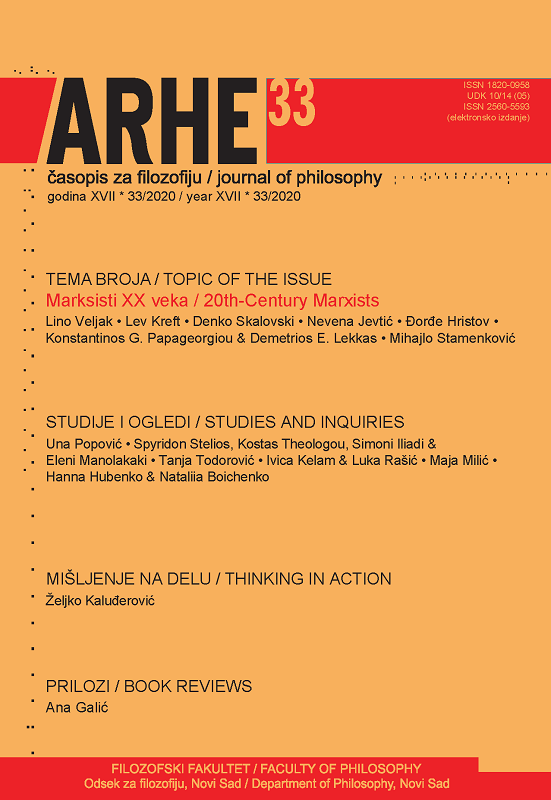PHANTASY AND CREATIVITY IN PHILOSOPHY OF ORTEGA Y GASSET
Main Article Content
Abstract
Ortega y Gasset’s philosophical inheritance is not systemically conceived. Therefore, the notions of fantasy and creativity in this paper are interpreted in the framework of his ontological research and in the context of his reflections on the "new", "young", avant-garde art. It shall be shown that his concept of fantasy is not understood in a traditional way, as a special "organ" or a moment in the epistemological scheme, but as one of the fundamental ways in which man relates to the world. Man is understood as a homo viator whose task is to interpret his own reality. Having a phantasy, man is being able to set an interpretive attitude towards life, and in the contemporary world he also has this attitude towards works of art themselves. On the other hand, we shall set off his critique of the notion of creativity based on the philosophy of art, and show the reaffirmation of this notion in the context of the rational-vitalist position.
Article Details
References
Aristotel. Nikomahova etika, Izdavačka knjižarnica Zorana Stojanovića, Sremski Karlovci-Novi Sad, 2013.
Benjamin, Andrew. Art, mimesis and the avant-garde: aspects of a philosophy of difference. Routledge, London, 2005.
Benjamin, Walter. The work of art in the age of its technological reproducibility, and other writings on media. Harvard University Press, London, 2008.
Buber, Martin, and Eugenio Ímaz. ¿ Qué es el hombre?. Fondo de Cultura Económica, Mexico, 1949.
Carroll, Noël. „The Ontology of Mass Art“ in: The Journal of Aesthetics and Art Criticism, 55 (1977) 2, pp. 187-199. URL: https://www.jstor.org/ stable/431263
Doorman, Maarten. „From Romanticism to the Avant-Garde“, in: Art in Progress, Amsterdam University Press. 2003, pp. 45-59.URL: https://www.jstor.org/stable/j.ctt46mz0k.
Eriugena, Johanes. „O podeli prirode“, u: Od Aristotela do renesanse, Nakladni zavod Matice hrvatske, Zagreb, 1982.
Gaset, José y Ortega. Dehumanizacija umetnosti i drugi eseji, LITTERIS, Zagreb, god. 2007.
Gasset, José y Ortega. En torno a Galileo, Esquema de la Crisis, Revista de Occidente, 1976.
Gasset, José y Ortega. Historia como sistema. Espasa-Calpe, 1971.
Gasset, José y Ortega. Ideas y creencias. Revista de Occidente, Madrid, 1934.
Gasset, José y Ortega. „¿Qué es filosofía?“, en: Obras Completas, Revista de Occidente, 405(1969)8, Madrid.
Gasset, José y Ortega, and Takeru Sugiyama. La idea de principio en Leibniz y la evolución de la teoría deductiva. Revista de Occidente, 1979.
Gasset, José y Ortega. Sobre el punto de vista en las artes. Revista de Occidente, 1929., p. 129-148.
Gasset, José y Ortega and Talbot, Toby. The origin of philosophy. New York: North & Company, 1967.
Habermas, Jürgen. „Modernity – An Incomplete Project“, in: Foster, H. The anti-aesthetic: Essays on postmodern culture, Bay Press, Washington, 1983.
Heidegger, Martin. Kant i problem metafizike, Mladost, Beograd, 1979.
Husserl, Edmund. Ideja fenomenologije, pet predavanja, Beogradski izdavačko-grafički zavod, Beograd, 1975.
Huserl, Edmund. Kartezijanske meditacije 1, Centar za kulturnu delatnost Saveza socijalističke omladine, Zagreb, 1975., str. 142.
Kantarberijski, Anselmo. „Proslogion“, u: Quid vere sit Deus, Demetra, Zagreb, 1977, str. 155.
Krznar, Tomislav. „Čovjek mase ili o ulozi filozofije u obrazovanju; Uvidi Ortege y Gasseta.“ u: Filozofska istraživanja, Zagreb, 35 (2016) 4, str. 645-656.
Maljevič, Kazimir Severinovič. Bog nije zbačen. Zadruga praksa, Pula, 2015.
Poggioli, Renato. The Theory of the Avant-garde, Cambridge, Harvard University Press, 1968.
Prole, Dragan. Pojave odsutnog, Izdavačka knjižarnica Zorana Stojanovića, Novi Sad-Sremski Karlovci, 2016.
Prole, Dragan. „Redukcija u fenomenologiji i slikarstvu“ u:. Годишњак Филозофског факултета у Новом Саду, 41(2016)2, str. 67-77.
Rajković, Marica. „Kraj umetnosti kao početak estetike“, u: Estetika i obrazovanje, Estetičko društvo Srbije, Beograd, 2011., str. 15-35.
Rajković, Marica. „Umetnost i duh vremena“, u: Kriza umetnosti i nove umetničke prakse, Estetičko društvo Srbije, Beograd, 2014, 239-261.
